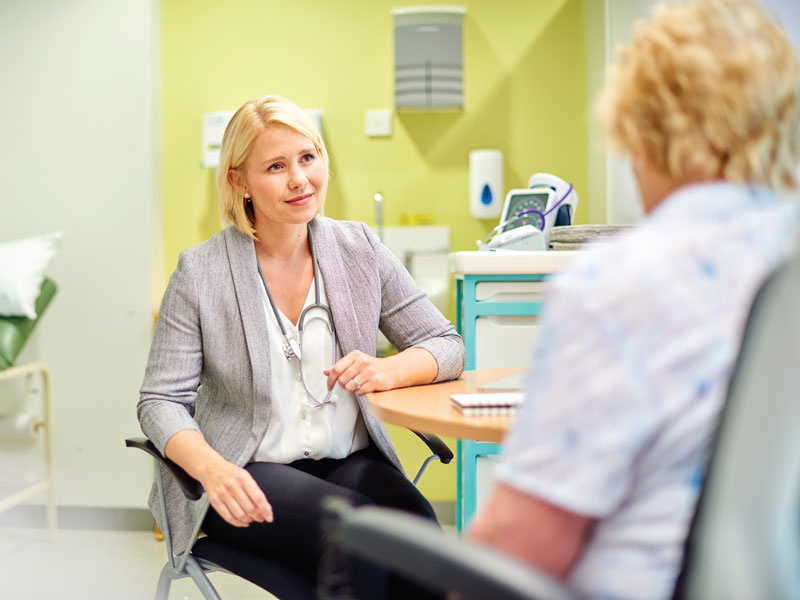Nurses Are Critical to Recognizing Adverse Events From Immune Checkpoint Inhibitors
Although immune checkpoint inhibitors can be highly effective cancer treatments, potentially even curative in several disease states, they can cause immune-related adverse events in any tissue or organ system, presenters said in a session at the inaugural ONS Bridge™ virtual conference.
- Read more about Nurses Are Critical to Recognizing Adverse Events From Immune Checkpoint Inhibitors
- Add new comment
We Must Work to Achieve Health Equity in Cancer Research
The National Institutes of Health Revitalization Act of 1993 mandated appropriate inclusion of minorities in all NIH-funded research. Yet more than 20 years later, vast disparities still exist in cancer research, researchers reported in a session for the inaugural ONS Bridge™ virtual conference.
Innovation and Opportunity Lead to a Distinguished Career in Nursing Research
“Nursing is at the forefront of symptom management, and nurse-designed interventions lead the way,” Gwen Wyatt, RN, PhD, FAAN, FAPOS, recipient of the 2020 ONS Distinguished Nurse Researcher Award, said in a session at the inaugural ONS Bridge™ virtual conference. She shared lessons from her career journey and told nurses that ONS can help them get their ideas “off the drawing board.”
- Read more about Innovation and Opportunity Lead to a Distinguished Career in Nursing Research
- Add new comment
Develop a Standard Approach to Recognize Lab Abnormalities and Adverse Events With Immune Checkpoint Inhibitors
By harnessing the power of a patient’s own immune system, immune checkpoint inhibitors improve antitumor immunity by blocking negative regulators (checkpoints) of T-cell function that exist on both immune and tumor cells. They essentially stop the immune system from turning off before cancer is completely eliminated.
- Read more about Develop a Standard Approach to Recognize Lab Abnormalities and Adverse Events With Immune Checkpoint Inhibitors
- Add new comment
The Case of the Delicate Discussion

Over the past three years, Sharon, age 38, has been intermittently receiving treatment for ovarian cancer. She was initially treated with carboplatin and paclitaxel and remained in remission for 20 months. She responded well to second-line therapy (carboplatin, gemcitabine, and bevacizumab), remaining on bevacizumab maintenance until she experienced a relapse eight months later.
The Public Trusts Nurses’ Voices During Health Emergencies

The cacophony that echoes through the 24-hour news cycle can be heavy on an average day but overwhelming during a global health pandemic. That is why relying on a trusted voice is essential when attempting to understand how to deal with the voluminous information that bombards us through radio, television, emails, social media, and any other channels that deem themselves news outlets these days.
Word Choice Matters When Caring for Patients With Cancer

Oncology nurses use many tools to help our patients, but one of the most effective is our words. However, our terminology may be overwhelming to patients and feel like medical jargon. We also often use terms to describe how a patient is experiencing cancer, reporting adverse events, noncompliance, failing treatment, and palliative care, which can be confusing and misleading.
Oncology Nurses Break the Silence on Workplace Bullying and Incivility
Bullying behaviors remain prevalent in nursing, resulting in turnover, poor work performance, and emotional trauma. During a session for the inaugural ONS Bridge™ virtual conference, Terri Townsend, MA, RN, CCRN-CMC, CMSRN, of Community Hospital Anderson, and Pamela Anderson, MSN, RN, CCRN, ANP-BC, of St. Vincent Medical Group, shed light on how to eliminate this pervasive issue.
- Read more about Oncology Nurses Break the Silence on Workplace Bullying and Incivility
- Add new comment
Finding Joy and Meaning in Work Promotes Resilience in Oncology Nurses
Perhaps now more than ever, oncology nurses may need to be reminded to reflect on what brings them joy and meaning in their work—and how to find it again, if they’ve lost it along the way.
- Read more about Finding Joy and Meaning in Work Promotes Resilience in Oncology Nurses
- Add new comment
Black Box Warnings Guide Oncologic Emergencies in Acute Care and Outpatient Settings
The transition of chemotherapy and immunotherapy delivery from the acute care and clinic settings to the home setting has created a need for innovative strategies to keep patients safe. Today, with decreased face-to-face interactions, the need for those strategies and tools is even greater in a system reliant on multiple facilities and disciplines to collaborate care in a time when resources are sometimes scarce or minimal, Mary Jo Sarver, ARNP, AOCN®, CRNI, VA-BC, LNC, said in an on-demand session for the inaugural ONS Bridge™ virtual conference.





